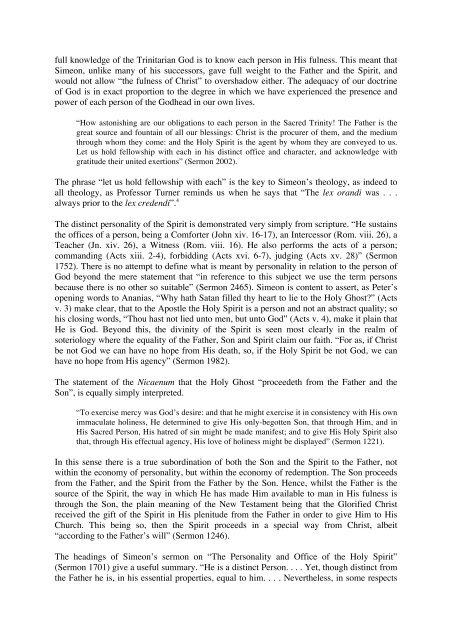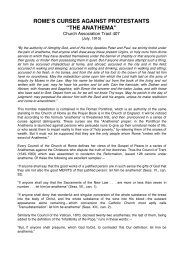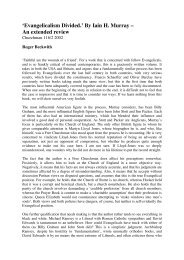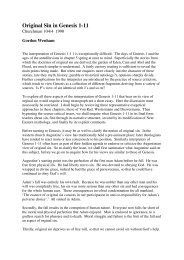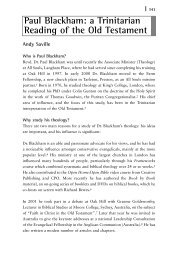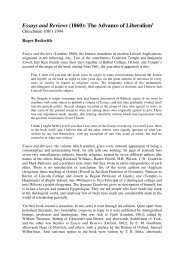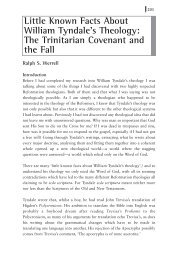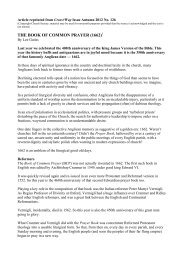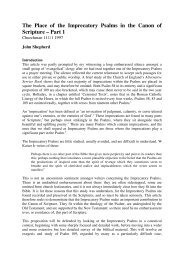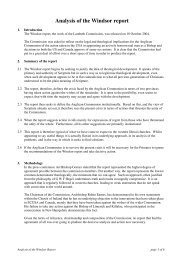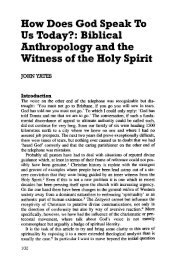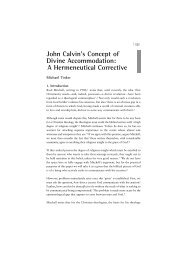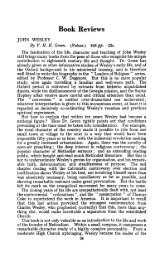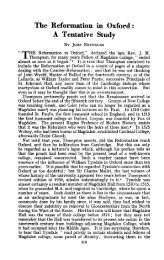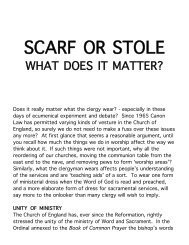The Holy Spirit in the Teaching of Charles Simeon - Church Society
The Holy Spirit in the Teaching of Charles Simeon - Church Society
The Holy Spirit in the Teaching of Charles Simeon - Church Society
You also want an ePaper? Increase the reach of your titles
YUMPU automatically turns print PDFs into web optimized ePapers that Google loves.
full knowledge <strong>of</strong> <strong>the</strong> Tr<strong>in</strong>itarian God is to know each person <strong>in</strong> His fulness. This meant that<br />
<strong>Simeon</strong>, unlike many <strong>of</strong> his successors, gave full weight to <strong>the</strong> Fa<strong>the</strong>r and <strong>the</strong> <strong>Spirit</strong>, and<br />
would not allow “<strong>the</strong> fulness <strong>of</strong> Christ” to overshadow ei<strong>the</strong>r. <strong>The</strong> adequacy <strong>of</strong> our doctr<strong>in</strong>e<br />
<strong>of</strong> God is <strong>in</strong> exact proportion to <strong>the</strong> degree <strong>in</strong> which we have experienced <strong>the</strong> presence and<br />
power <strong>of</strong> each person <strong>of</strong> <strong>the</strong> Godhead <strong>in</strong> our own lives.<br />
“How astonish<strong>in</strong>g are our obligations to each person <strong>in</strong> <strong>the</strong> Sacred Tr<strong>in</strong>ity! <strong>The</strong> Fa<strong>the</strong>r is <strong>the</strong><br />
great source and founta<strong>in</strong> <strong>of</strong> all our bless<strong>in</strong>gs: Christ is <strong>the</strong> procurer <strong>of</strong> <strong>the</strong>m, and <strong>the</strong> medium<br />
through whom <strong>the</strong>y come: and <strong>the</strong> <strong>Holy</strong> <strong>Spirit</strong> is <strong>the</strong> agent by whom <strong>the</strong>y are conveyed to us.<br />
Let us hold fellowship with each <strong>in</strong> his dist<strong>in</strong>ct <strong>of</strong>fice and character, and acknowledge with<br />
gratitude <strong>the</strong>ir united exertions” (Sermon 2002).<br />
<strong>The</strong> phrase “let us hold fellowship with each” is <strong>the</strong> key to <strong>Simeon</strong>’s <strong>the</strong>ology, as <strong>in</strong>deed to<br />
all <strong>the</strong>ology, as Pr<strong>of</strong>essor Turner rem<strong>in</strong>ds us when he says that “<strong>The</strong> lex orandi was . . .<br />
always prior to <strong>the</strong> lex credendi”. 4<br />
<strong>The</strong> dist<strong>in</strong>ct personality <strong>of</strong> <strong>the</strong> <strong>Spirit</strong> is demonstrated very simply from scripture. “He susta<strong>in</strong>s<br />
<strong>the</strong> <strong>of</strong>fices <strong>of</strong> a person, be<strong>in</strong>g a Comforter (John xiv. 16-17), an Intercessor (Rom. viii. 26), a<br />
Teacher (Jn. xiv. 26), a Witness (Rom. viii. 16). He also performs <strong>the</strong> acts <strong>of</strong> a person;<br />
command<strong>in</strong>g (Acts xiii. 2-4), forbidd<strong>in</strong>g (Acts xvi. 6-7), judg<strong>in</strong>g (Acts xv. 28)” (Sermon<br />
1752). <strong>The</strong>re is no attempt to def<strong>in</strong>e what is meant by personality <strong>in</strong> relation to <strong>the</strong> person <strong>of</strong><br />
God beyond <strong>the</strong> mere statement that “<strong>in</strong> reference to this subject we use <strong>the</strong> term persons<br />
because <strong>the</strong>re is no o<strong>the</strong>r so suitable” (Sermon 2465). <strong>Simeon</strong> is content to assert, as Peter’s<br />
open<strong>in</strong>g words to Ananias, “Why hath Satan filled thy heart to lie to <strong>the</strong> <strong>Holy</strong> Ghost?” (Acts<br />
v. 3) make clear, that to <strong>the</strong> Apostle <strong>the</strong> <strong>Holy</strong> <strong>Spirit</strong> is a person and not an abstract quality; so<br />
his clos<strong>in</strong>g words, “Thou hast not lied unto men, but unto God” (Acts v. 4), make it pla<strong>in</strong> that<br />
He is God. Beyond this, <strong>the</strong> div<strong>in</strong>ity <strong>of</strong> <strong>the</strong> <strong>Spirit</strong> is seen most clearly <strong>in</strong> <strong>the</strong> realm <strong>of</strong><br />
soteriology where <strong>the</strong> equality <strong>of</strong> <strong>the</strong> Fa<strong>the</strong>r, Son and <strong>Spirit</strong> claim our faith. “For as, if Christ<br />
be not God we can have no hope from His death, so, if <strong>the</strong> <strong>Holy</strong> <strong>Spirit</strong> be not God, we can<br />
have no hope from His agency” (Sermon 1982).<br />
<strong>The</strong> statement <strong>of</strong> <strong>the</strong> Nicaenum that <strong>the</strong> <strong>Holy</strong> Ghost “proceedeth from <strong>the</strong> Fa<strong>the</strong>r and <strong>the</strong><br />
Son”, is equally simply <strong>in</strong>terpreted.<br />
“To exercise mercy was God’s desire: and that he might exercise it <strong>in</strong> consistency with His own<br />
immaculate hol<strong>in</strong>ess, He determ<strong>in</strong>ed to give His only-begotten Son, that through Him, and <strong>in</strong><br />
His Sacred Person, His hatred <strong>of</strong> s<strong>in</strong> might be made manifest; and to give His <strong>Holy</strong> <strong>Spirit</strong> also<br />
that, through His effectual agency, His love <strong>of</strong> hol<strong>in</strong>ess might be displayed” (Sermon 1221).<br />
In this sense <strong>the</strong>re is a true subord<strong>in</strong>ation <strong>of</strong> both <strong>the</strong> Son and <strong>the</strong> <strong>Spirit</strong> to <strong>the</strong> Fa<strong>the</strong>r, not<br />
with<strong>in</strong> <strong>the</strong> economy <strong>of</strong> personality, but with<strong>in</strong> <strong>the</strong> economy <strong>of</strong> redemption. <strong>The</strong> Son proceeds<br />
from <strong>the</strong> Fa<strong>the</strong>r, and <strong>the</strong> <strong>Spirit</strong> from <strong>the</strong> Fa<strong>the</strong>r by <strong>the</strong> Son. Hence, whilst <strong>the</strong> Fa<strong>the</strong>r is <strong>the</strong><br />
source <strong>of</strong> <strong>the</strong> <strong>Spirit</strong>, <strong>the</strong> way <strong>in</strong> which He has made Him available to man <strong>in</strong> His fulness is<br />
through <strong>the</strong> Son, <strong>the</strong> pla<strong>in</strong> mean<strong>in</strong>g <strong>of</strong> <strong>the</strong> New Testament be<strong>in</strong>g that <strong>the</strong> Glorified Christ<br />
received <strong>the</strong> gift <strong>of</strong> <strong>the</strong> <strong>Spirit</strong> <strong>in</strong> His plenitude from <strong>the</strong> Fa<strong>the</strong>r <strong>in</strong> order to give Him to His<br />
<strong>Church</strong>. This be<strong>in</strong>g so, <strong>the</strong>n <strong>the</strong> <strong>Spirit</strong> proceeds <strong>in</strong> a special way from Christ, albeit<br />
“accord<strong>in</strong>g to <strong>the</strong> Fa<strong>the</strong>r’s will” (Sermon 1246).<br />
<strong>The</strong> head<strong>in</strong>gs <strong>of</strong> <strong>Simeon</strong>’s sermon on “<strong>The</strong> Personality and Office <strong>of</strong> <strong>the</strong> <strong>Holy</strong> <strong>Spirit</strong>”<br />
(Sermon 1701) give a useful summary. “He is a dist<strong>in</strong>ct Person. . . . Yet, though dist<strong>in</strong>ct from<br />
<strong>the</strong> Fa<strong>the</strong>r he is, <strong>in</strong> his essential properties, equal to him. . . . Never<strong>the</strong>less, <strong>in</strong> some respects


